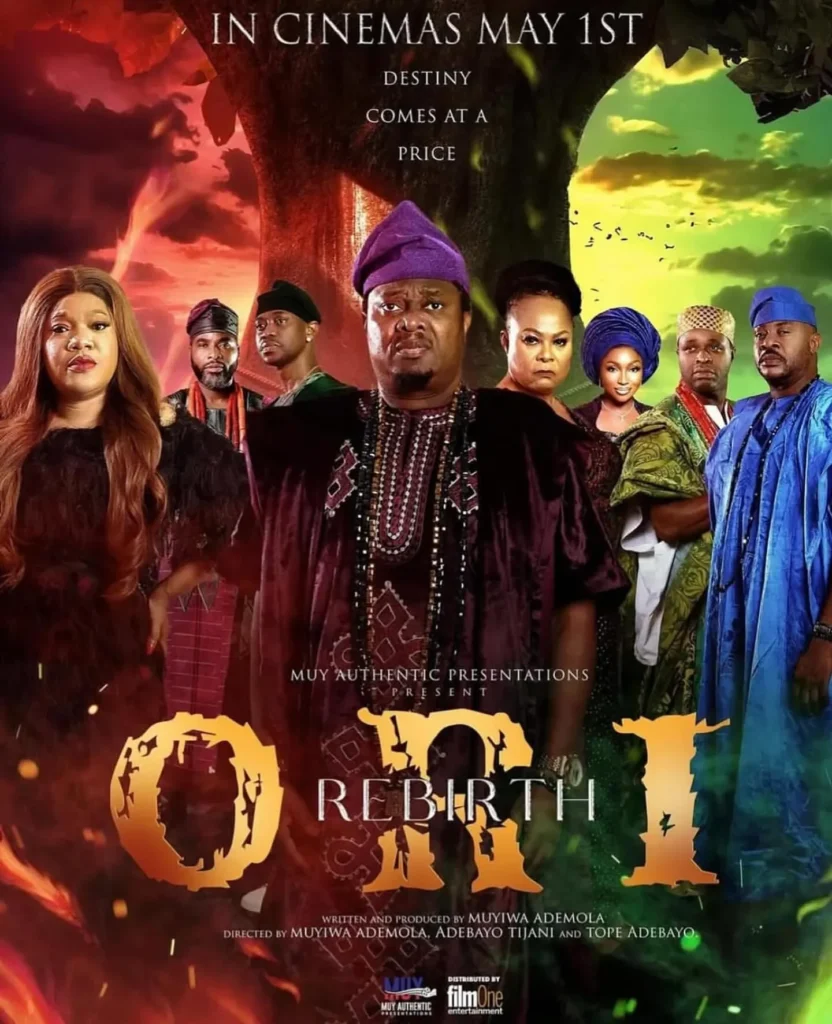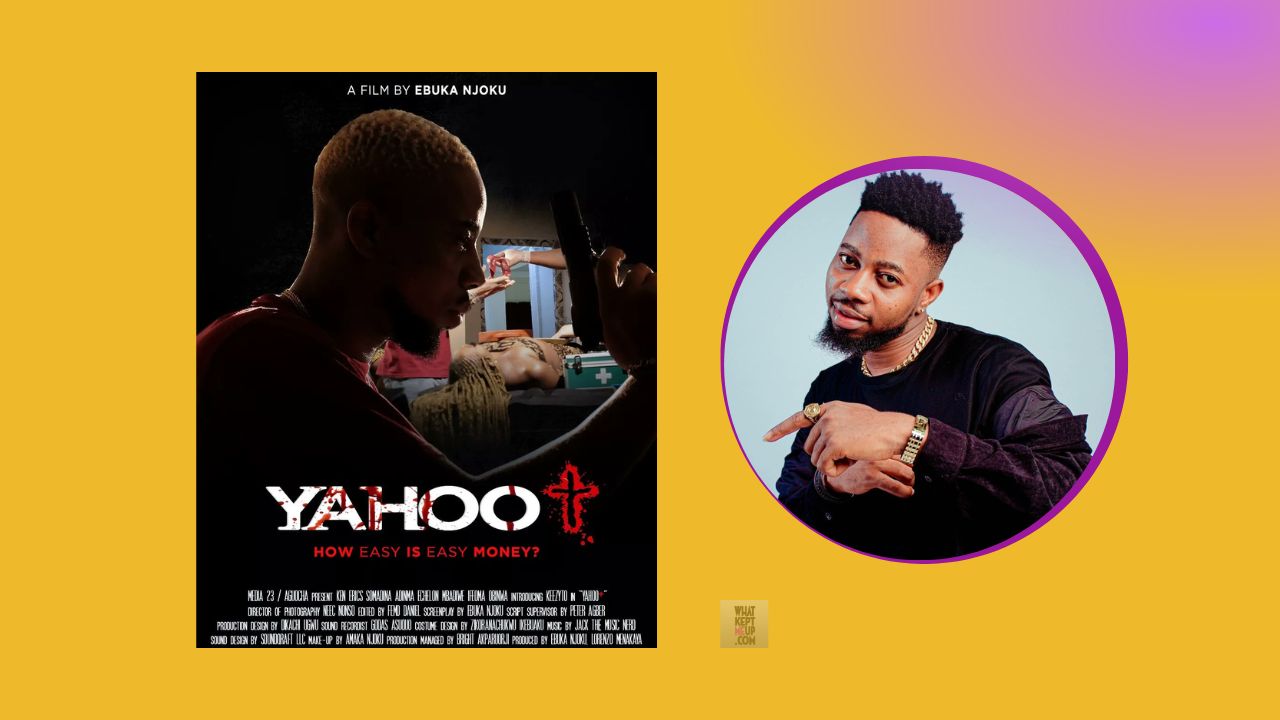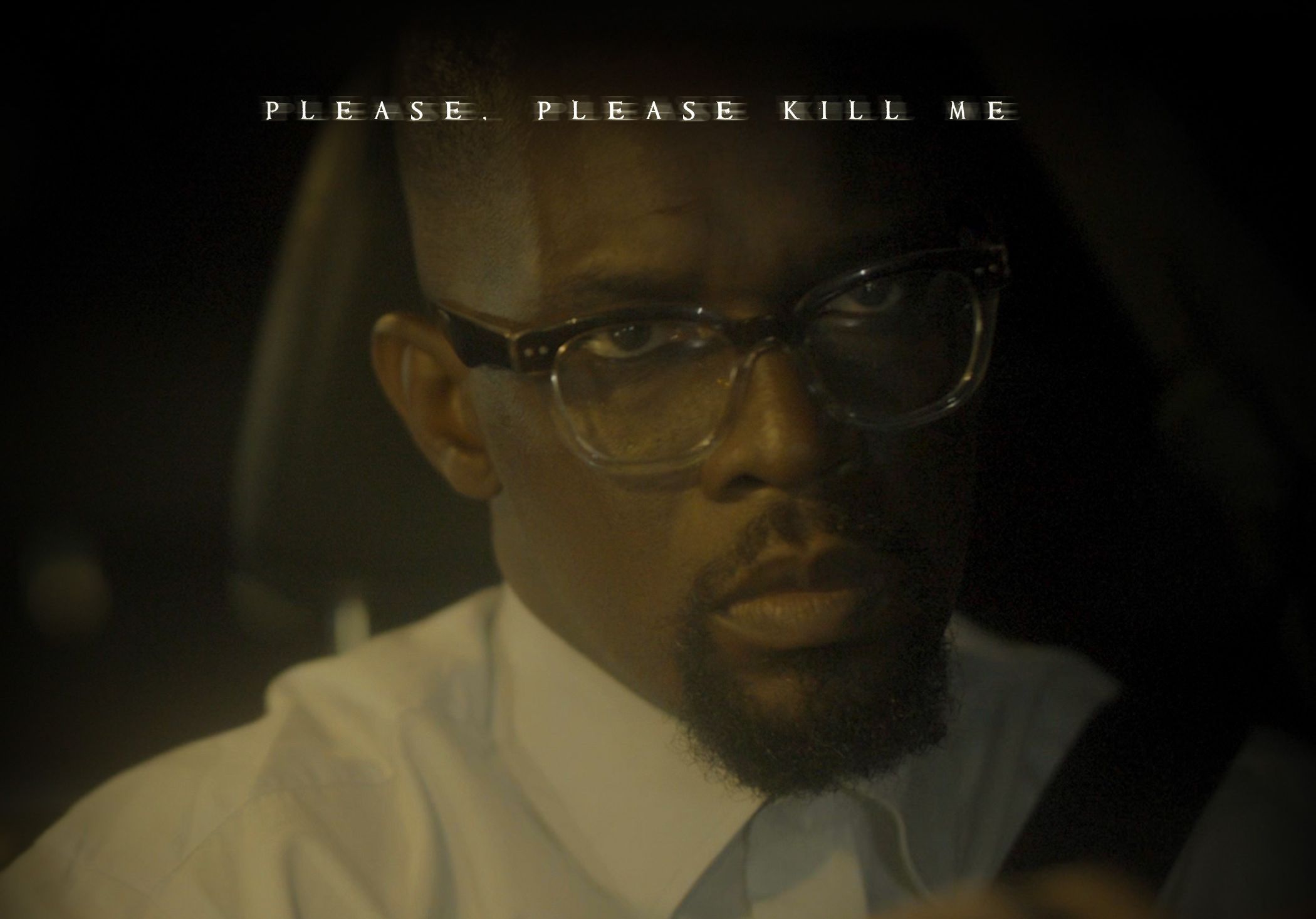Ori Rebirth, a reboot of the beloved Ori (2004), brings back Muyiwa Ademola as Bisade in an ambitious outing that painfully untethers itself from the Yoruba classic in crucial spots. With its reflective meditation on madness, the Yoruba metaphysical concepts of Ori (fate), Ifa (divination), ayanmọ (predestination), and the interconnection of spiritual intuition and destinies, Ori was a cultural milestone in Yoruba cinema two decades ago. Ori Rebirth, a follow-up with a compelling premise, heaps misfortune upon misfortune on Bisade, raising one pressing question: does the 2025 film offer the reimagined world meaningful emotional growth and spiritual reckoning, or does it merely rehash the lead’s torment for spectacle?

Vaguely following the template of the original, Ori Rebirth focuses on Bisade (calmly and adoringly played by Muyiwa Ademola), a man with a dogged inner head. He’s pitted against a deadly cult led by his mother-in-law, Yeye Fernandez (Sola Sobowale in her usual over-dramatic flair), who makes his life uneasy. Due to a secret deal struck by her deceased husband, they want Bisade killed (barely justified) to ensure her family avoids misfortune and gains greater financial success. With her powers, she commands Bisade to travel from Abuja to Lagos so that she can give him a jinxed evil gold necklace. But Bisade’s strong head causes his jet to crash, leaving him amnesiac in a village. There, he builds a new life with Temidun (played by Toyin Abraham with a warmth and strength that grounds the film in emotional reality), who nurtures him and becomes his wife. His newly formed life and amnesia struggle, alongside Yeye Fernandez’s resolve to have him killed, form the supernatural conflict within this family drama directed by Muyiwa Ademola, Tope Adebayo, and Adebayo Tijani.
The film introduces us to Bisade as a man content in his marriage to Olapeju (played by a quietly intense, vulnerable, yet resiliently appealing Omowunmi Dada). Their relationship, at first glance, seems to embody domestic bliss. But this harmony is swiftly disrupted by the spiritual attack orchestrated by Olapeju’s mother, Yeye Fernandez. This sets the stage for Bisade’s survival, subsequent amnesia, fight for memory between two wives, and the unravelling of his relationships. The main narrative hinges on Bisade’s journey to reclaim his memory and reconcile his past with his present, particularly as he strives to connect his life with Olapeju and Temidun. The film, however, prioritises the superficiality of the occurrence over spirituality, leaving us overwhelmed by Temidun’s travail and unnecessary court sessions about whose husband Bisade truly is. This makes it difficult to engage emotionally beyond surface-level sympathy.
With its little cultural sensitivity, Ori Rebirth struggles with an overburdened narrative and a shallow examination of the mysterious power of the inner head. It bombards us with a relentless series of traumatic incidents in Bisade’s life—the life-threatening accident, disorienting battle with amnesia, fractured relationships, and existential crises—that risk turning the film into trauma porn, a deviation from the original’s exploration of loyalty, love, and predestination of fate. In an onslaught that feels gratuitous, Ori Rebirth rarely pauses to let these heavy moments breathe and allow Bisade (and us) to process them meaningfully.
Ori Rebirth undermines its potential by further framing the predestination of fate as a forced battle between good and evil; the film corrupts the richness of the Ori concept, treating it more as a plot device than a theme worth interrogating. When Bisade thinks back on his life with Temidun during the battle for his true memory, he returns to the village to make amends and reunite. Tragically, he discovers Temidun and their son in a house engulfed in flames. By rescuing them, Bisade earns a heroic status and redemption. However, these scenes, intended to solidify his predestined connection with Temidun (a familiar revelation scene in the 2004 Ori) are underdeveloped. It leaves us with an unclear sense of Bisade’s transformation from a troubled, confused man to a determined one.
The original Ori, with the Yoruba cinema happy-ending style, showed that there are rewards for good deeds while questioning the fairness of fate and the place of man’s purpose. It leaned heavily on Yoruba cosmology, presenting Ori as a guiding force that shaped Bisade’s life through introspective moments. Within its better-handled narrative, we were able to feel the weight of Bisade’s choices, right from the inciting decision spurred by his friend’s (Saheed Balogun) dilemma.
Nonetheless, this remake remembers to explore the interconnection of destinies. It clearly ties Bisade’s survival to Temidun’s love, the healing and redemption of Besuwi (played by Ibrahim Chatta in a minor role), a character Bisade encountered during his insanity period in the original, and the downfall of Yeye and her cult. Revisiting the first Ori and tying in these key scenarios with Rebirth, the screenwriters Opeyemi Akinbiyi and Afeez Adekunle did their homework. Despite that, the film still unravels plots while piling on more unnecessary subplots.
The convoluted plot of Ori Rebirth holds it back, resulting in a less enjoyable exploration of the mysterious workings of one’s head. While the film’s spiritual ambition attempts to align with the legacy of the original, it doesn’t reach the same depth. Still, it presents a sense of cultural awareness and modern continuity of the fate concept, making it a decent, if imperfect, extension.
Ori Rebirth premiered in cinemas May 1.
Become a patron: To support our in-depth and critical coverage—become a Patron today!
Join the conversation: Share your thoughts in the comments section or on our social media accounts.
Track Upcoming Films: Keep track of upcoming films and TV shows on your Google calendar.
Side Musings
- The original Ori was released 21 years ago, a time before phones became smart and social media turned into our alternate universe. Bisade’s friend Bosun (Saheed Balogun) even dismisses his mobile phone as a pure fraud, with an epileptic character made with the blood of an abiku — a spirit child in Yoruba belief, fated to die young and return in a cycle of suffering. In Rebirth, phones are no longer mute spectators but active players in the haunting, saving, and ultimate redemption of Bisade (Muyiwa Ademola). The evolution of mobile technology from a dubious device in Ori to a vital instrument in Ori Rebirth reflects how our lives and the stories we tell about fate and agency have changed in two decades.
- It’s intriguing and distasteful how Bisade’s Ori keeps tossing him around, toying with his sanity. It’s not appealing if that’s how Ori Inú (Inner Head) operates. What’s the joy when the inner head batters the outer one in the name of destiny?
- If Temidun’s village is so backwards that they only see a car or lorry in a week, where did she get an almost 5-litre gallon of petrol to set her home on fire? And why is she and her son unflinching in the heat of the flames as though they are listening to Arsonist’s Lullabye?
- The jet crash is also a callback to the original when Bisade arrives in the village and maniacally responds that he arrived in a jet.
- Even the appearance of Besuwi in Rebirth is questionable. In the original, the sacrifice he made backfired and he was mysteriously strangled. But, is a character ever dead if you don’t see the body?






1 Comment